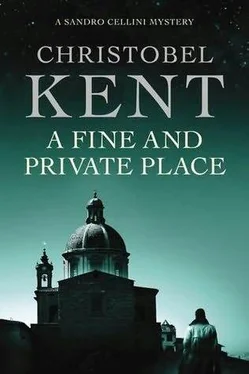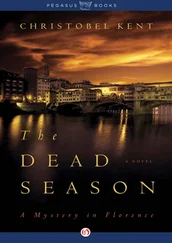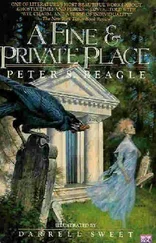Christobel Kent - A fine and private place
Здесь есть возможность читать онлайн «Christobel Kent - A fine and private place» весь текст электронной книги совершенно бесплатно (целиком полную версию без сокращений). В некоторых случаях можно слушать аудио, скачать через торрент в формате fb2 и присутствует краткое содержание. Год выпуска: 2011, ISBN: 2011, Издательство: Macmillan, Жанр: Криминальный детектив, на английском языке. Описание произведения, (предисловие) а так же отзывы посетителей доступны на портале библиотеки ЛибКат.
- Название:A fine and private place
- Автор:
- Издательство:Macmillan
- Жанр:
- Год:2011
- ISBN:9781429970808
- Рейтинг книги:4 / 5. Голосов: 1
-
Избранное:Добавить в избранное
- Отзывы:
-
Ваша оценка:
- 80
- 1
- 2
- 3
- 4
- 5
A fine and private place: краткое содержание, описание и аннотация
Предлагаем к чтению аннотацию, описание, краткое содержание или предисловие (зависит от того, что написал сам автор книги «A fine and private place»). Если вы не нашли необходимую информацию о книге — напишите в комментариях, мы постараемся отыскать её.
A fine and private place — читать онлайн бесплатно полную книгу (весь текст) целиком
Ниже представлен текст книги, разбитый по страницам. Система сохранения места последней прочитанной страницы, позволяет с удобством читать онлайн бесплатно книгу «A fine and private place», без необходимости каждый раз заново искать на чём Вы остановились. Поставьте закладку, и сможете в любой момент перейти на страницу, на которой закончили чтение.
Интервал:
Закладка:
‘I suppose they’re only doing the right thing, nip it in the bud if she is into drugs,’ he’d continued. He’d thought of the girl giggling with her friends over hot chocolate. ‘Though so far she hasn’t put a foot wrong. End of the week generally, though, that’s when she goes out, Thursday, Friday: last night she stayed in.’ He had shot Luisa a glance. ‘So I guess I’ll be late back tomorrow.’
Luisa had nodded, looked suddenly anxious.
‘She’s a nice kid,’ Sandro had said, touched. ‘She’ll be all right.’
‘Good,’ Luisa had said, giving him a little pat, getting back to her feet. On the table her glass had been barely touched.
‘So what’s this all about?’ Sandro had inquired as he bent to check on the progress of the polpettone .
‘What?’ Luisa had said over her shoulder.
‘This cooking frenzy,’ he’d said, smiling. ‘Not that I’m complaining.’
He hadn’t really thought there would be a reason. But there was.
‘Lay the table,’ she’d said, ‘and I’ll tell you.’
He’d known he wouldn’t like it.
Just outside the city walls the pink Vespa went across a big junction on amber, and Sandro jumped the red after her, because suddenly he just didn’t care. A delivery van blared his horn, cutting behind him, and Sandro didn’t even look round.
The sun was just up, topping the hills of the Casentino to the east, shining down the silver length of the Arno as he wound under the huge umbrella pines that lined the Viale Michelangelo. They were almost there; ahead of him Carlotta Bellagamba slowed, the little Vespa swaying, as if she too was taking in the view. As if she too was brought up short by it, their staggering city. The low, flat sun gleamed off the golden ball that topped the vast red dome of Santa Maria del Fiore, and beyond it to the south-west the distant Appennines were dusted with snow.
The pink Vespa darted to the left at the last minute; an old man in a hat and overcoat hopped angrily out of the way. Sandro took the turn in leisurely pursuit.
The school — the Liceo Classico Marzocco — was the best, naturally enough. The high plastered walls that lined the street — no more than a country lane, it might seem to the outsider, with overhanging wisteria and magnolia — concealed some of the most exclusive properties in the city. Ahead of Sandro his target was slotting her Vespa into a long row of mopeds in front of a pristine façade, as she’d done every day he’d been watching her.
Sandro drove on at a sedate pace, and once out of sight he pulled up in someone’s drive and hopped out.
The pavement outside the school was crowded now with students smoking and chatting, stamping their feet in the cold and laughing before going inside. They were leaving it to the last moment; it was gone eight now. Sandro walked slowly so as to give himself time to pick Carlotta out. He had to step off the pavement, it was so crowded, and then a shiny, powerful new Audi forced him back into the crowd, coming to a halt right in front of the school gates. A handsome, moustachioed older man in an impeccable suit — a bit of a Frollini, thought Sandro, 1,000-euro suit, nice tan, and disliked him on sight — climbed out and began to lecture the lanky, long-haired boy who climbed sulkily out of the passenger seat. Son, or grandson? Son, Sandro decided; this man was clearly wealthy enough, and smooth enough, to have picked up a woman of childbearing years later in life. He seemed entirely indifferent to any obstruction his wide, low car might represent. Eventually the boy sloped off and, after standing an arrogant, leisurely minute to watch him go, the man climbed back in to the Audi and left.
Impatiently Sandro waited for the big car to move off, half an eye on the tall boy, moving through the crowd. To his mild surprise it was at Carlotta that the lanky boy stopped, Carlotta, in her violet knitted hat, and stooped to greet her. He was casual, but Carlotta’s body language told Sandro that if the kid wasn’t her boyfriend, she wished he was. This was the first time Sandro had seen him, which would imply that hedidn’t observe the school timetable very scrupulously. His long hair was smooth and shiny, and he was carrying an ex-army backpack. Carlotta put her hand through his arm; he didn’t object. They went inside.
Sandro waited, leaning against the wall of the school as he had done every day, in case she came back out. There were young people practised in the techniques of truancy; they knew enough not to just go missing, they knew how to sign themselves in then slip away. But there was also this: the street was so lovely in the sharp blue light, so suddenly peaceful now that the students had disappeared inside, that he felt he might stand there all day. So as not to have to think.
The school stood opposite a low stone wall behind which the ground fell away and down into a little valley filled with olive trees and an immaculate villa before rising again to meet his beautiful city’s imposing mediaeval wall, slanting across the hill. It was possibly the most perfect view Sandro had ever seen: the silver-green of the trees, the golden stucco of the villa, the rough grey stone of the city’s fortifications and the distant, stately outline of the great cathedral beyond them. Woodsmoke was drifting up from somewhere on the slopes below, the light was rosy with the early hour, the sky was an almost impossibly clean, clear blue.
Luisa.
It turned out that standing here was not the way to avoid thinking, after all. Sandro stamped his feet in inarticulate frustration, and the sound grated on the quiet air. He should be hand-in-hand with Luisa walking through these narrow lanes and gazing on the city; they should be enjoying their retirement.
Smoothing things over had never been Sandro’s strong point in the marriage — he preferred to sit out a disagreement in silence — but he had tried last night; in fact, he thought he’d succeeded. Luisa had genuinely thought he was delighted for her; it wasn’t like her to deceive herself but perhaps, on this occasion, she had just heard what she had wanted to hear.
‘Darling,’ she’d said, tapping the wooden spoon on the side of the pan, replacing the lid, untying the apron, ‘there’s something I need to tell you.’
Six months earlier the words would have raised the hairs on the back of his neck. But that terror had eased; now Sandro had the luxury of a lower-grade anxiety, the nagging, guilty, self-pitying kind that said, what about me?
‘Well, not so much tell you,’ she’d reconsidered, ‘as ask you.’ Her eyes had danced. And she’d held his gaze. How was it, he’d found himself wondering, that after all the poison they put in her system, her skin still had that soft, luminous look? They’d said something about not going in the sun, about some effect or other the chemo could have, but it couldn’t be just chemical: she’d looked glorious, transcendent in the steam from her pans.
‘Go on,’ Sandro had found himself smiling into her eyes. How bad could it be? He was worrying over nothing; she had good news of some kind, that much was clear.
‘They’re promoting me,’ she’d said, a smile twitching at her lips. She’d tucked a stray hair behind her ear and Sandro had seen that she was wearing a little make-up. ‘Well, sort of, anyway.’
‘Uh-huh,’ Sandro had managed to say. ‘ Cara , that’s great.’ Then he’d considered. ‘But you’re the manageress. How can they promote you when you’re already in charge?’ He was still smiling but he could hear himself sounding querulous, questioning her news. Grudging her the triumph.
‘Ah, well, Frollini — ’ and she’d flushed, barely perceptibly, ‘he wants me to play more of an active role. In buying, you know.’
Читать дальшеИнтервал:
Закладка:
Похожие книги на «A fine and private place»
Представляем Вашему вниманию похожие книги на «A fine and private place» списком для выбора. Мы отобрали схожую по названию и смыслу литературу в надежде предоставить читателям больше вариантов отыскать новые, интересные, ещё непрочитанные произведения.
Обсуждение, отзывы о книге «A fine and private place» и просто собственные мнения читателей. Оставьте ваши комментарии, напишите, что Вы думаете о произведении, его смысле или главных героях. Укажите что конкретно понравилось, а что нет, и почему Вы так считаете.












